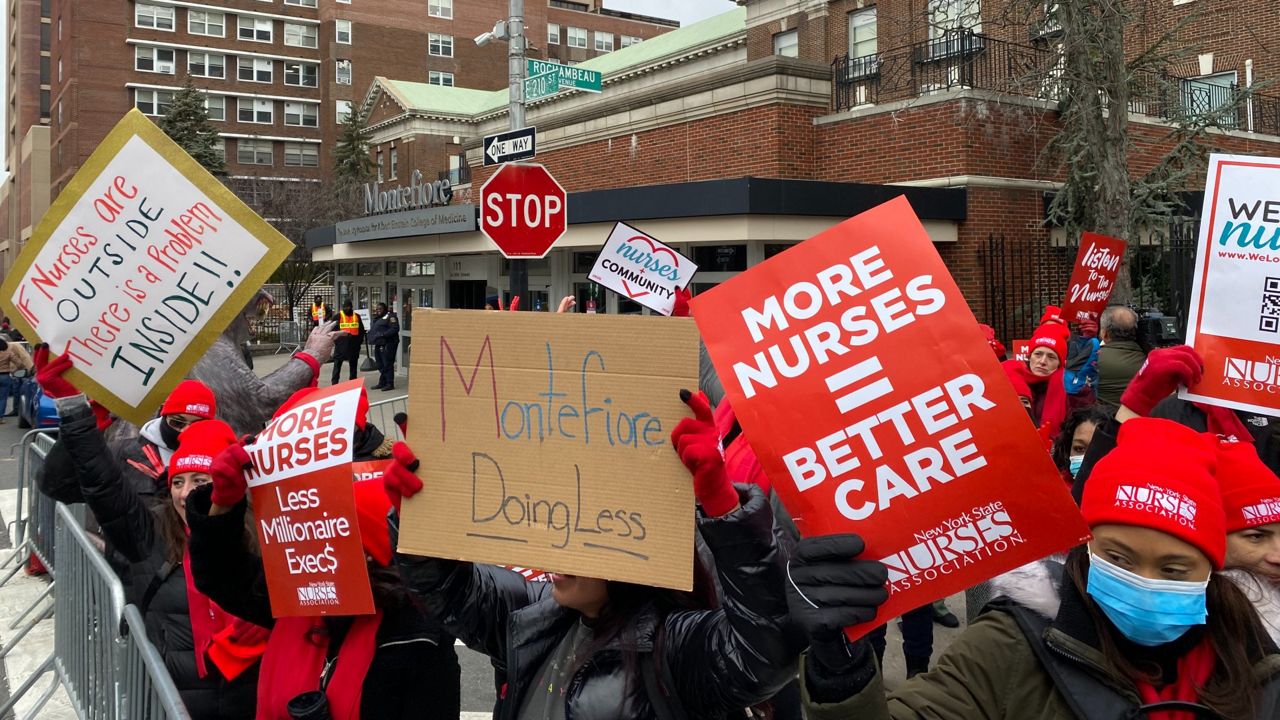About 100,000 registered nurses called it quits during the COVID-19 pandemic, with more half a million more planning to leave the workforce by 2027, according to a new survey from the National Council of State Boards of Nursing released on Thursday.
What You Need To Know
- One-fifth of the United States' 4.5 million nurses plan to quit in next five years, according to a new report
- About 100,000 registered nurses already called it quits during the COVID-19 pandemic
- Over 60% of respondents reported increased workloads during the pandemic, with roughly half feeling drained, used up, fatigued, and/or burned out “a few times a week” to every day, according to the data
- The report estimates 188,000 nurses under 40 intended to leave the workforce in the coming years
“Approximately 100,000 registered nurses (RNs) left the workforce during the COVID-19 pandemic in the past two years due to stress, burnout and retirements,” according to the report’s key findings, with the group estimating more than 610,000 nurses with more than 10 years of experience and an average age of 57 have an “intent to leave” their jobs within the next five years for the same reasons.
“Altogether, about one-fifth of RNs nationally are projected to leave the health care workforce,” the NCSBN said in a statement.
Another estimated 188,000 nurses younger than 40 have “similar intentions” to leave the workforce in the coming years, the organization said.
The NCSBN — a nonprofit whose membership includes nursing regulatory bodies in all 50 states, Washington, D.C., and four U.S. territories — said their study is “the most comprehensive and only research in existence” on the phenomenon, examining the root causes of nurses’ decision to leave the workforce.
Nearly 55,000 nurses from 45 states responded to the survey and the NCSBN used population distributions across the country to extrapolate across the 4.5 million registered nurses in the country.
Over 60% of respondents reported increased workloads during the pandemic, with roughly half feeling drained, used up, fatigued, and/or burned out “a few times a week” to every day, according to the data. Nearly 30% felt like they were “at the end of the rope.”
Nurses with 10 or fewer years of experience most commonly felt this way, according to NCSBN. The result was a 3.3% decline in the number of U.S. nurses over the last two years.
“The data is clear: the future of nursing and of the U.S. health care ecosystem is at an urgent crossroads,” said Maryann Alexander, NCSBN’s chief officer of nursing regulation and a nurse herself, in a statement. “The pandemic has stressed nurses to leave the workforce and has expedited an intent to leave in the near future, which will become a greater crisis and threaten patient populations if solutions are not enacted immediately.”
“There is an urgent opportunity today for health care systems, policymakers, regulators and academic leaders to coalesce and enact solutions that will spur positive systemic evolution to address these challenges and maximize patient protection in care into the future,” Alexander continued.
The report comes as nurses across the country have come under increasing pressure due to staffing shortages, the proliferation of better-paid traveling nurses from out of state to address those staffing shortages, and the once-in-a-century health care crisis caused by the COVID-19 pandemic.
In New York City, more than 7,000 nurses went on strike earlier this year before earning new contracts with major private hospitals.
“Our work post-pandemic, because this is a national workforce crisis, is to retain our nurses,” Francis Cartwright, a chief nursing officer at Mount Sinai Hospital in Manhattan, told Spectrum News in January. “They call it ‘The Big Retirement.’ We've had so many nurses that are retired or they returned home to the community, many became travelers or decided to leave the profession.”
Public sector nurses in New York have also been pushing for a new contract, but are legally barred from striking.
Sonia Lawrence, a nurses union official, told Spectrum News in January she expected a “mass exodus” from the city’s public hospital system if the union’s demands were not met.
In December, 15,000 nurses threatened to go on strike in Minnesota, but hospitals there reached a new contract with just days to spare.
And in Michigan, a nurses union voted to approve a strike, but reached a contract in February that raised wages, limited mandatory overtime, and addressed staffing levels.
A University of Michigan study released last week found 39% of nurses in Michigan planned to leave their jobs within a year, including 59% for nurses under 25 and 53% for nurses between the ages of 25 and 35.
“The fact that our youngest nurses are showing the highest likelihood of leaving tells us we can’t just add more nurses to the problem. This rate of departures and vacancies is not sustainable and executives need to undertake urgent actions to improve working conditions,” the study’s lead author Christopher Friese said in a statement.
Of the over 9,000 Michigan nurses surveyed, 84% said they were emotionally exhausted and 60% reported inadequate staffing and resources.
Abuse in the workplace is also rampant, according to the research: 43% reported emotional abuse, 22% reported physical abuse and 10% reported sexual abuse. Another 26% reported workplace bullying.



